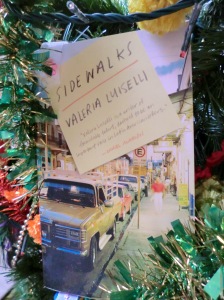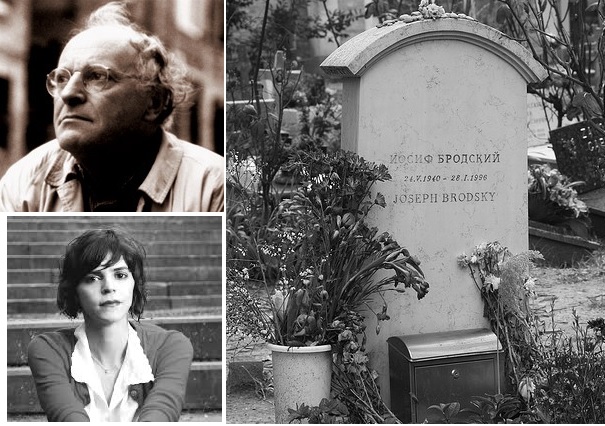 Valeria Luiselli is a philosophical meanderer whose roving thoughts bring her to a cemetery in Venice in search of Russian poet, Joesph Brodsky’s tomb and wandering that alluring city’s streets so late at night she is locked out of the one room she managed to find in a convent.
Valeria Luiselli is a philosophical meanderer whose roving thoughts bring her to a cemetery in Venice in search of Russian poet, Joesph Brodsky’s tomb and wandering that alluring city’s streets so late at night she is locked out of the one room she managed to find in a convent.
She ponders the map with the slow-moving icon of a plane on the screen as she flies home and thinks about the layout of the land beneath and later will find a connection between a photo of cartographers in the Mexican Map Library and Rembrandt’s The Anatomy Lesson of Dr. Nicolaes Tulp.
Sidewalks sees her leaving the four walls of her apartment late at night for a last cigarette outside the front door, seeking escape and encountering the advice and wisdom of a doorman who shares his own long life views on how one best comes to know thyself.
“If there still exists a gaze blessed with liminal wisdom, it is the gaze of night-shift doormen. They are the only true free-thinkers – generous men capable of conversing intelligently at midnight; empathetic accomplices, offering the consolation of a companionship replete with the same reprehensible vices you yourself have and defend.”
She laments the age of the individual computer, the window inside the window that has all but eliminated household drama and made high-rise voyeurism unexciting if not nonexistent.
“It is clear that the personal computer is the great modern attack on good old-fashioned voyeurism. From the moment these machines were installed in our homes, the irreversible process of the degeneration of character began and ruled out the possibility of anyone doing anything interesting for the delight of their voyeuristic neighbour.”
She is interested in spaces, voids, the edge of things, she tries to make sense of her home town in Mexico, a city whose first plan was allegedly scratched into sand and has continued to sprawl out of any recognisable or logical shape ever since.
Her essays reference other essayists as things she observes in her meandering bring back lines once read and remembered, passages of long dead authors become an old-fashioned, enjoyable distraction for a young woman, those words from the past arising unbidden while out walking sidewalks, no electronic media in sight.
In an essay on the river Spree, in Berlin, Fabio Morabito writes:
“A river tends to contain the city it crosses and to curb its ambitions, reminding it of its face; without a river, that is, without a face, a city is abandoned to itself and can become, like Mexico city, a blot.”
It is a slim volume and many of the essays are split into titled paragraphs, the first essay littered with the names and dates of the dead inhabiting the same resting place as Brodsky, although it wasn’t clear to me whether there was a link between the content and the named.
It feels as though there could well be much more to this collection than is picked up on first reading, especially given the original work was written in Spanish and many of the named places are foreign.
Intelligent, introspective essays that delight in being out and about and an appreciative and noteworthy introduction by the Dutch author and translator Cees Nooteboom. An author to watch out for.



Sounds interesting. I am LOVING The Bees by the way. Hope you have a wonderful Christmas and a very happy, healthy, successful New Year.
LikeLiked by 1 person
It is an interesting collection Fransi. So glad you are enjoying The Bees, an exceptional work of the imagination isn’t it?
Thank you for your good wishes Fransi, you too, I wish you all the best and fun times over the festive season and that all your wishes come true in 2015!!
LikeLiked by 1 person
Thanks Claire. And yes, it (The Bees) is exceptional!
LikeLike
I had considered reading Sidewalks as my book for Mexico, but I read Women with Big Eyes by Angeles Mastretta instead. I can’t tell whether Sidewalks would be to my taste or not. Philosophical meanderings could be hit or miss, I think.
LikeLiked by 1 person
Clearly not in the same category as Women With Big Eyes. Luiselli is an interesting writer, because her thinking is grounded in the practical, it’s what comes from travelling, walking, cycling and observing. The way its presented in small chunks and being such a slim volume, makes it pretty easy reading, but it’s also kind of abstract, not at all mundane. I’d say she’s a good alternative choice for Mexican Literature.
LikeLike
Lovely review Claire. I agree with you on the rereading point – there’s a meditative, reflective quality to Luiselli’s writing, and I’m sure I’ll revisit the collection. I love that quote about the doorman; it’s as if she’s found a kindred spirit in an anonymous city. The Mexico City map story fascinated me too, how it morphed and bled into the surrounding area.
LikeLiked by 1 person
I love good essay collections, Claire, thanks for writing about this one. I especially love reading authors outside the US, who travel to other locations – how are their perspectives different and the same as those of us here in the US. By the way, I’ll likely be visiting Paris (and France) for the very first time this spring, as my son has a co-op there! I hope to give a book/literary focus to my stay but haven’t figured out what that will be yet. Just watched Midnight in Paris again, I love that movie!
LikeLike
Pingback: The Story of My Teeth, by Valeria Luiselli, translated by Christina MacSweeney | ANZ LitLovers LitBlog
Thanks for this, Claire, I have linked it to my review of The Story of My Teeth:)
LikeLike
Great, it was interesting for me too to go back and read my thoughts on her essays in light of your review. I think the essays might be a good introduction to the author, a kind of warning perhaps, she certianly has an interesting mind and likes to explore the routes she takes at some depth.
LikeLike
Pingback: Women’s Prize For Fiction 2019 Longlist – Word by Word
Pingback: Dublin Literary Award Winner 2021 – Word by Word